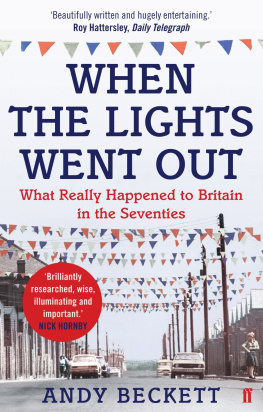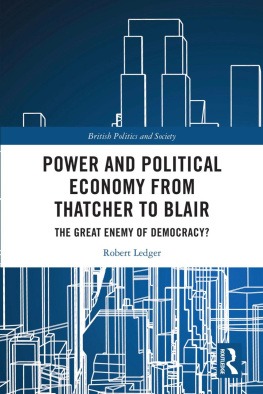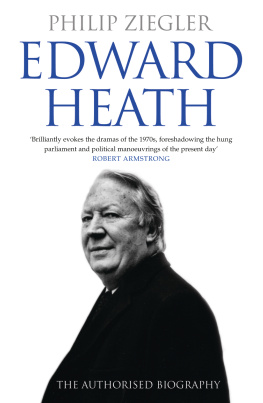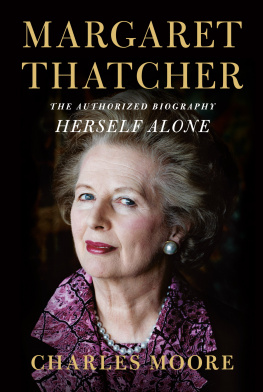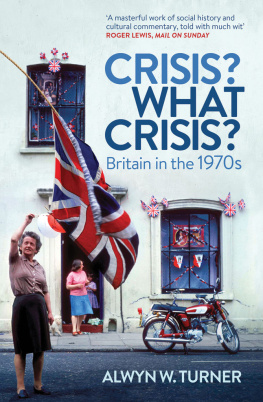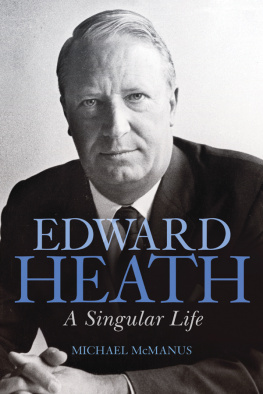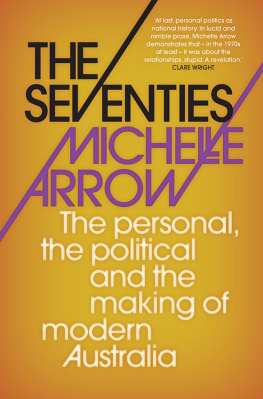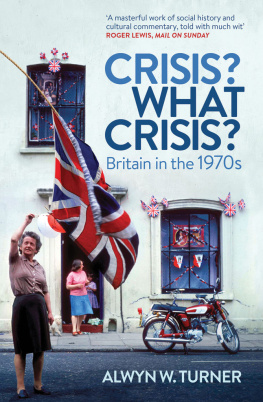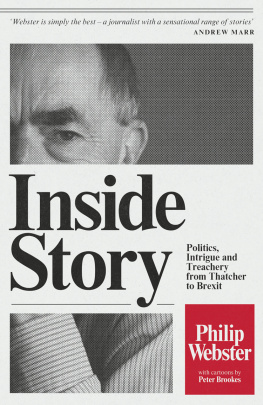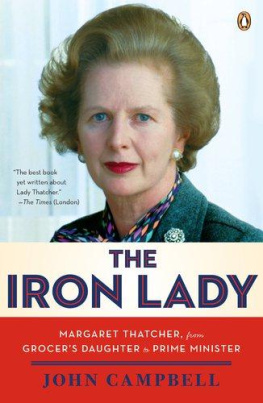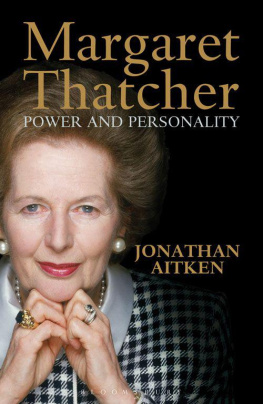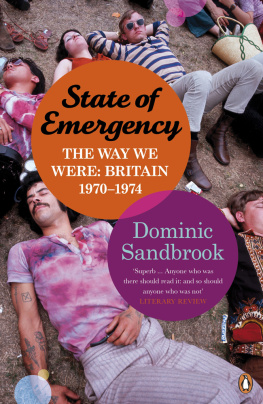Illustrations
. Edward Heath celebrates winning the June 1970 general election.
. Heaths dream of the future: an early model of Maplin airport, planned by his government to be built on an artificial island off Southend-on-Sea.
. Striking miners swamp the police cordon and close the Saltley coke depot in Birmingham in February 1972.
. A Belfast street on a bad day in the seventies.
. When the lights went out: Piccadilly Circus partly blacked-out during the three-day week, 1 February 1974.
. Harold Wilson, a fading prime minister by 1975, in the custody of Jack Jones, General Secretary of the Transport and General Workers Union, and Vic Feather, Secretary of the Trades Union Congress.
. North Sea oil rigs under construction at Nigg in the Scottish Highlands, mid-seventies.
. Members of the Gay Liberation Front protest on behalf of arrested members of the Womens Liberation Front outside Bow Street Magistrates Court, 4 February 1971.
. Sid Rawle, hippy anarchist and organiser of the 1975 Watchfield free festival, arrives for a meeting at the Department of the Environment, 20 August 1975.
. Waiting for the next Britain: the newly-built Civic Centre in Milton Keynes, May 1977.
. Police shove back pickets so that a bus carrying Grunwick employees who are still working can get through, 11 July 1977.
. Jayaben Desai, one of the leaders of the strike at the Grunwick plants between 1976 and 1978.
. The limits of seventies union power: pickets stuck outside Fort Grunwick, as George Ward called his premises, summer 1977.
. Prime Minister Jim Callaghan speaking in Tamworth during the 1979 general election.
. Public Enemy Number One: Jamie Morris, ex-Tory, militant shop steward, and leader of the infamous strike at Westminster Hospital during the Winter of Discontent.
. The shape of things to come: Margaret Thatcher speaking two months before becoming prime minister.
Introduction: Our Weimar?
The seventies. Two words that have won a million British political arguments. All countries have their difficult eras periods of national embarrassment, of slipping confidence, of decline, of crisis, both real and imagined. We are in one now. But for Britain since the Second World War, by common consent for decades now, the worst of times came between the election of Edward Heath in 1970 and the election of Margaret Thatcher in 1979.
Here is Tony Blair, speaking at the 2005 Labour Party conference, shortly after the death of perhaps the most tainted seventies prime minister of all, James Callaghan:
When I listened on Sunday to the tributes to Jim Callaghan, I recalled the 90th birthday party we gave for him at Downing Street a few years back. Around the room: Denis Healey talking to Roy Jenkins; Tony Benn with Shirley Williams. Michael Foot, Jack Jones. What brilliance; and what a pity They were great people. But they were not ready [before 1979] to see change was coming And if they had been, how many fewer lives would have been destroyed? How much harsh and bitter medicine for some of the poorest in our society might have been avoided?
And here is David Cameron, barely a teenager when the seventies ended, still feeling he should include a passage about the decade in a speech to the think tank Demos in 2006:
Economic decline was embodied in inflation, stagnation and rising unemployment deteriorating industrial relations: unions versus management, workers versus the bosses In 1950 1,389,000 working days were lost to industrial action. By 1979, this had multiplied to 29,400,074 the highest on record. Margaret Thatcher set out to deal not only with the problems of this British disease but also with its causes With huge courage and perseverance, she turned Britain into a different country.
I was born in 1969. The politics of the seventies, even in their broadest sense, are in the blurriest margins of my childhood memories. In 1974, in retrospect around the high-water mark of radical hippiedom in provincial England, I remember mysterious hairy men coming and going between terrifying banks of nettles to a disused glasshouse they had turned into an arts centre behind our back garden in the Hertfordshire suburbs. In the feverish summer of 1975, a boom time for plots and protests in Britain, I remember being frustrated on holiday in Suffolk by the first test-cricket match I had tried to follow. With England close to victory, the match, inexplicably to my mind, was called off. Saboteurs seeking the release from prison of an East End robber I had never heard of had poured oil on the wicket. Two years later, in the snowy, bad-tempered winter of 1977 a dress rehearsal, it turned out, for the Winter of Discontent the year after I remember my father, then a colonel in the Royal Engineers, working late and seeming slightly irritable. The firemen were on strike and he had suddenly become Kents chief fire officer. And in the slow grey spring of 1979, with Margaret Thatcher moving seemingly unstoppably towards Downing Street, I remember watching the election build-up on television in my grandmothers bedroom. I remember feeling sorry for Callaghan, without knowing exactly why.
I cant recall much else. But I have been hearing what was wrong with Britain and British politics in the seventies all my adult life. No other political theme has been as unrelenting. The seventies were grim. The seventies were the hangover from the sixties. The seventies were violent. The seventies were a dead end. Above all: we dont want to go back to the seventies.
The decade of Watergate and Baader Meinhof, of world recession and the oil crisis, was a jarring period for most wealthy countries, just like the current one. Yet Britains problems in the seventies were widely seen at the time and since, by foreign as well as domestic commentators as among the worst in the West. Since then, Britain has arguably changed more than any other rich nation. Part of this transformation is down to the power of British prime ministers with large parliamentary majorities to impose their domestic policies, which is greater than in most democracies, and to the effectiveness at this task of Margaret Thatcher in particular. But her eighties majorities and policies and ways of operating politically were, in a substantial sense, products of the previous decade. They were reactions against the failures of the seventies, a counter-revolution against its consensuses, a determination not to repeat its mistakes.
I grew up in the eighties and nineties basically believing the traditional story of the British seventies. After all, it was not just Thatcherites who told it: left-wing people would scorn or regret the Callaghan years; liberals would condemn the brutality towards Irish republicans under Edward Heath; almost no one had a good word for the Harold Wilson administration of 19746.
Yet occasionally this version of the seventies would seem too neat. First, there was the question of seventies popular culture. Almost as soon as that decade was over, people had started reviving its tastes. By 2000, as far as such things can be measured, the seventies had probably even overtaken the sixties as the British nostalgia markets favourite. How had the dead-end Britain of the seventies produced such a flowering of pop music, fashion and television? Some of it could be attributed to the stimulus of bad times seventies Britain as a kind of Weimar Republic, a spooky parallel often invoked under Wilson and Callaghan while some of the recurring appetite for seventies culture could be put down to simple generational nostalgia and love of kitsch.

